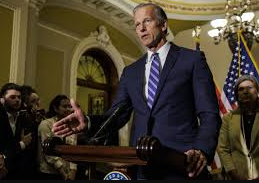
Stricter Measures Aim to Limit Asylum Access, Further Cracking Down on Border Crossings
On Monday, the Biden administration announced stricter asylum regulations at the southern U.S. border in an effort to address growing concerns about immigration ahead of the upcoming elections. These changes build upon the policies implemented in June, tightening the conditions under which migrants can apply for asylum.
The revised regulations stipulate that migrants can only apply for asylum if daily border encounters remain below 1,500 for nearly a month. Previously, the threshold for lifting the restrictions was 2,500 encounters, with the average dropping below 1,500 for just one week. Additionally, the new rules now count migrant children, including those from outside of Mexico, toward the daily encounter limit.
This latest shift in policy aims to make it significantly harder for migrants to seek asylum, particularly for those entering the country at unofficial border crossings. Despite previous restrictions implemented in June, the administration claims that the flow of migrants has not sufficiently decreased to lift the measures. Currently, the Department of Homeland Security reports an average of 1,800 daily encounters at the southern border.
The new rules come into effect on Tuesday and are part of the Biden administration’s continued push to strengthen border security. Critics, including immigration advocates, have condemned the new measures, calling them a de facto asylum ban. Organisations such as the American Immigration Lawyers Association argue that the rule’s exceptions are insufficient and the restrictions may remain indefinitely if current trends persist.
Kelli Stump, president of the American Immigration Lawyers Association, voiced concern, stating, “The consequences of denying asylum to someone fleeing persecution could be a matter of life or death.”
In response, Homeland Security Secretary Alejandro Mayorkas defended the policy, asserting that the asylum system was not entirely cut off and that there were specific exceptions for vulnerable individuals, such as victims of severe trafficking. Additionally, migrants can still apply through the CBP One system by scheduling an appointment to approach official border points.
However, the number of appointments available through this app remains limited, with only 1,450 slots per day, far fewer than the demand. Despite this, the administration claims that the new restrictions have led to a significant reduction in migrant arrivals at the southern border, with Border Patrol encounters dropping by over 50% since June.
The Biden administration has faced criticism from Republicans, including former President Donald Trump, who argue that the administration has not done enough to control the surge in border crossings. Meanwhile, Vice President Kamala Harris, during her first visit to the Arizona border as the Democratic nominee, called for a balance between strengthening border security and creating a more humane and orderly immigration system. Harris emphasized that it was possible to secure the border while also welcoming immigrants legally.




















Comments
Hello world!
Pic of the week: Sunset at margate beach
The first day’s journey was through the pink fields
The first day’s journey was through the pink fields
The first day’s journey was through the pink fields